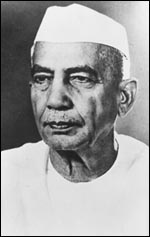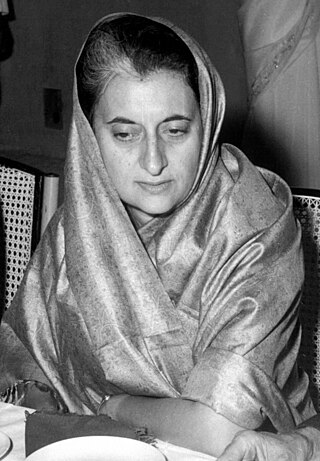
Morarji Ranchhodji Desai was an Indian independence activist and politician who served as the 4th Prime Minister of India between 1977 and 1979 leading the government formed by the Janata Party. During his long career in politics, he held many important posts in government such as Chief Minister of Bombay State, Home Minister, Finance Minister and 2nd Deputy Prime Minister of India.

Chaudhary Charan Singh served as the 5th prime minister of India between 28 July 1979 and 14 January 1980. Historians and people alike frequently refer to him as the 'champion of India's peasants.'

Shankarrao Bhavrao Chavan was an Indian politician who served as the Chief Minister of Maharashtra twice from 1975 until 1977 and from 13 March 1986 until 26 June 1988. He was the Finance Minister of India from 1988 to 1989 in Rajiv Gandhi ministry. He also served as the Home Minister of India twice, from 31 December 1984 to 12 March 1986 in the Rajiv Gandhi cabinet, and from 21 June 1991 to 16 May 1996 in the P. V. Narasimha Rao cabinet.

Bombay State was a large Indian state created at the time of India's Independence, with other regions being added to it in the succeeding years. Bombay Presidency was merged with the princely states of Baroda, Western India and Gujarat and the Deccan States.

Basappa Danappa Jatti was the fifth vice president of India, serving from 1974 to 1979. He was the acting president of India from 11 February to 25 July 1977. He also served as the chief minister of Karnataka. Jatti rose from a being a Municipality member to India's second-highest office during a five-decade-long chequered political career.

Raj Narain was an Indian freedom fighter and politician. He won in a famous electoral malpractice case against the then Prime Minister Indira Gandhi, which led to her disqualification and imposition of Emergency in India in 1975. He defeated Indira Gandhi during the 1977 Lok Sabha elections.

Gowdara Mallikarjunappa Siddeshwara, popularly known as G. M. Siddeshwara, is a member of the Lok Sabha, representing Davangere constituency of Karnataka since from 2004. He represents Davangere Constituency in 14th,15th,16th and 17th Lok Sabha. He was the Union Minister of State for Heavy Industries and Public Enterprises and prior to that, Minister of State for Civil Aviation of India till he resigned from the Ministry after a few days of cabinet reshuffle in July 2016.

Atal Bihari Vajpayee was sworn in as Prime Minister of India for third time on 13 October 1999. He headed his Third Vajpayee Ministry. Here is the list of ministers in his ministry.

Atal Bihari Vajpayee was sworn in as Prime Minister of India for first time on 16 May 1996.
Ghanshyam Chhotalal Oza was the Chief Minister of Gujarat, India from 17 March 1972 to 17 July 1973. He had a B.A. and L.L.B. He was a member of the Legislative Assembly of Saurashtra State from 1948 to 1956. He later became a member of the Legislative Assembly of Bombay state in 1956. He was a member of the Lok Sabha from 1957 to 1967 and again from 1971 to 1972. Later, he was a member of the Rajya Sabha from 10 April 1978 to 9 April 1984. He was a member of the Gujarat Legislative Assembly from 1972-74. He was a minister (1952–56) in U. N. Dhebar ministry when 'United State of Kathiawar' was formed. He became M.P. in 1957 when he won Lok Sabha seat from Surendra Nagar. In a very closely contested Loksabha election of Rajkot constituency in 1971, Ghanshyam Oza defeated Minoo Masani of the and became a minister in the cabinet of PM Indira Gandhi.

Mohan Dharia was a Union minister, a lawyer and social worker. During his last days he stayed in Pune. Dharia was an environmentalist and ran a non-government organisation Vanarai. He was elected to the Lok Sabha twice from Pune Lok Sabha constituency, first in 1971 as an Indian National Congress (INC) member and became a Minister of State, and later in 1977 as a Bharatiya Lok Dal member, and joined the Morarji Desai Ministry as Union Minister of Commerce. Prior to it, he remained member of the Rajya Sabha twice from INC, first 1964-1970 and then 1970- 1971
B. Shankaranand (1925-2009) was a congress leader from Karnataka and minister in government of India.

Inder Kumar Gujral was sworn in as Prime Minister of India on 21 April 1997. In his initial ministry, the ministers were as follows.

Rajiv Gandhi was sworn in as Prime Minister of India on 31 October 1984.

Indira Gandhi was sworn in as Prime Minister of India for the third time on 14 January 1980.

Charan Singh was sworn in as Prime Minister on 28 July 1979, with outside support by India Congress and Yashwantrao Chavan of Congress (Socialist) faction as his Deputy PM. Just before Singh was to prove his majority in Lok Sabha, Indira Gandhi withdrew support to his government, and he resigned on 20 August 1979, after just 23 days, the only PM who has failed to face parliament. He advised President Neelam Sanjiva Reddy to dissolve Lok Sabha. Janata Party leader Jagjivan Ram challenged the advice and sought time to cobble support. But Lok Sabha was dissolved, and Charan Singh continued as caretaker PM until January 1980.
Dajisaheb Ramrao Chavan was an Indian politician and served as a Member of parliament, Lok Sabha for 16 years. A member of the Indian National Congress, he was the former Union Deputy Minister for Defence and Law. His wife, Premala, represented his Lok Sabha seat after his death. Their son Prithviraj was Chief Minister of Maharashtra from 2010 to 2014.
Surendranath Dwivedy (1913-2001) was an Odia politician, journalist and social worker.
Shankarrao Chavan was appointed as Chief Minister of Maharashtra for the first time on 21 February 1975, replacing Vasantrao Naik. His first ministry lasted till 16 April 1977, and was succeeded by Vasantdada Patil's ministry.
B. G. Kher was the first Chief Minister of Bombay State. He had been the Prime Minister of the Bombay Presidency since 1946. The Presidency, on India's independence on 15 August 1947 became the Bombay State. Kher served until 1952 Bombay legislative elections. His government was succeeded by that of Morarji Desai.













